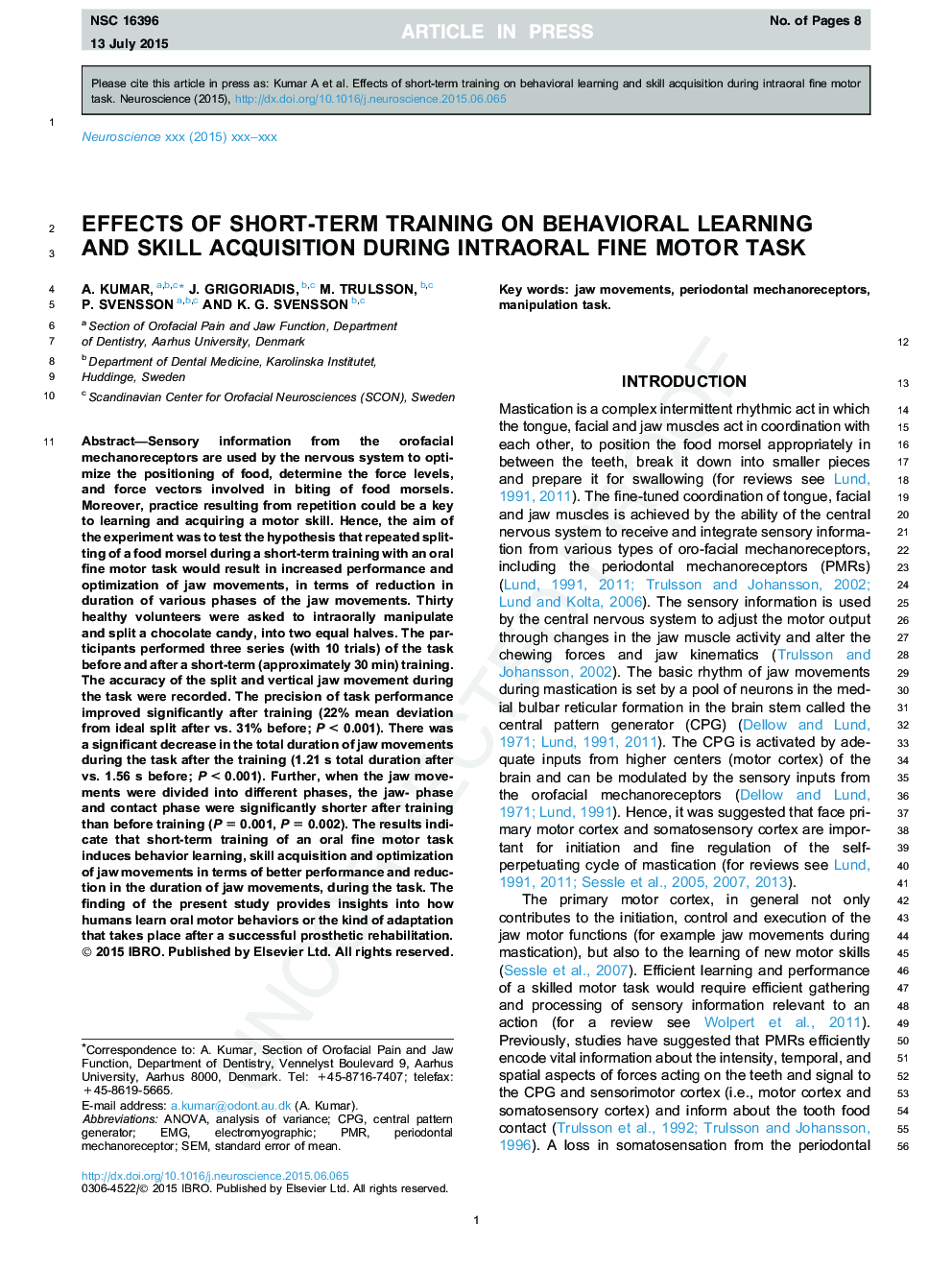| کد مقاله | کد نشریه | سال انتشار | مقاله انگلیسی | نسخه تمام متن |
|---|---|---|---|---|
| 6272195 | 1614770 | 2015 | 8 صفحه PDF | دانلود رایگان |
عنوان انگلیسی مقاله ISI
Effects of short-term training on behavioral learning and skill acquisition during intraoral fine motor task
ترجمه فارسی عنوان
تأثیر آموزش کوتاه مدت در یادگیری رفتاری و کسب مهارت در طی وظیفه حرکتی درون مفصلی
دانلود مقاله + سفارش ترجمه
دانلود مقاله ISI انگلیسی
رایگان برای ایرانیان
کلمات کلیدی
CpGPMRPeriodontal mechanoreceptorsPeriodontal mechanoreceptorEMG - الکترومیوگرافیelectromyographic - الکترومیوگرافیanalysis of variance - تحلیل واریانسANOVA - تحلیل واریانس Analysis of varianceJaw movements - حرکات فکstandard error of mean - خطای استاندارد میانگینSEM - مدل معادلات ساختاری / میکروسکوپ الکترونی روبشیCentral Pattern Generator - ژنراتور الگوی مرکزی
موضوعات مرتبط
علوم زیستی و بیوفناوری
علم عصب شناسی
علوم اعصاب (عمومی)
چکیده انگلیسی
Sensory information from the orofacial mechanoreceptors are used by the nervous system to optimize the positioning of food, determine the force levels, and force vectors involved in biting of food morsels. Moreover, practice resulting from repetition could be a key to learning and acquiring a motor skill. Hence, the aim of the experiment was to test the hypothesis that repeated splitting of a food morsel during a short-term training with an oral fine motor task would result in increased performance and optimization of jaw movements, in terms of reduction in duration of various phases of the jaw movements. Thirty healthy volunteers were asked to intraorally manipulate and split a chocolate candy, into two equal halves. The participants performed three series (with 10 trials) of the task before and after a short-term (approximately 30Â min) training. The accuracy of the split and vertical jaw movement during the task were recorded. The precision of task performance improved significantly after training (22% mean deviation from ideal split after vs. 31% before; PÂ <Â 0.001). There was a significant decrease in the total duration of jaw movements during the task after the training (1.21Â s total duration after vs. 1.56Â s before; PÂ <Â 0.001). Further, when the jaw movements were divided into different phases, the jaw opening phase and contact phase were significantly shorter after training than before training (PÂ =Â 0.001, PÂ =Â 0.002). The results indicate that short-term training of an oral fine motor task induces behavior learning, skill acquisition and optimization of jaw movements in terms of better performance and reduction in the duration of jaw movements, during the task. The finding of the present study provides insights into how humans learn oral motor behaviors or the kind of adaptation that takes place after a successful prosthetic rehabilitation.
ناشر
Database: Elsevier - ScienceDirect (ساینس دایرکت)
Journal: Neuroscience - Volume 306, 15 October 2015, Pages 10-17
Journal: Neuroscience - Volume 306, 15 October 2015, Pages 10-17
نویسندگان
A. Kumar, J. Grigoriadis, M. Trulsson, P. Svensson, K.G. Svensson,
